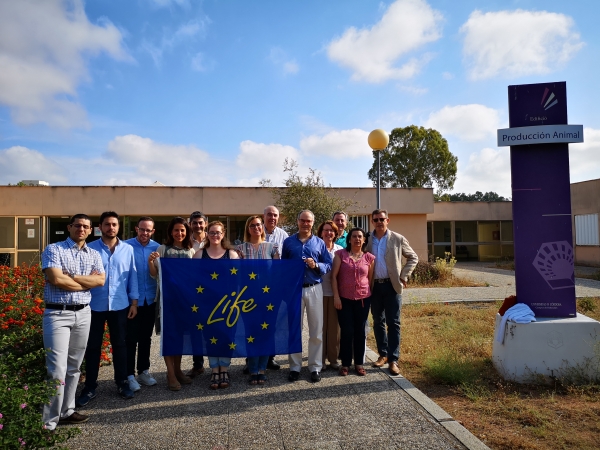Extensive livestock farming offers a series of incomparable advantages for society. It is a system of exploitation that seeks to render production compatible with the sustainability of the land, and is carried out in large areas where the animals feed on the environment's own resources. Thus, by its very nature it favours biodiversity and balance with the natural environment, anchors the population in rural areas, and produces products boasting high added value.
Despite its importance, it is currently undergoing a serious crisis in its profitability, aggravated by the effects of climate change. The increase in global temperature and the absence of precipitation produces a significant decrease in pastures, one of the cornerstones of extensive ranching and the entire trophic chain. Erosion worsens this scenario, which entails cost overruns and decreased productivity.
Europe's Life Live-Adapt project ("Adaptation to Climate Change of Extensive Livestock Production Models in Europe") is funded by the EU's LIFE program and aims to adapt extensive livestock farming to climate change, innovating and using new technologies through a multidisciplinary research team. It is slated to run from September, 2018 to September, 2022 and the University of Cordoba is participating as a coordinator.
"Traditionally, modernisation has been associated with intensive livestock farming," (as opposed to extensive) explains Vicente Rodríguez Estévez, the director of the project at the UCO, "but you can have modern and organic livestock farming in which animals roam free, do not depend on external feed, and, technological elements are still used". With this philosophy, the project, which began just a few months ago, and in which eight European partners are participating, will try to give a boost to these livestock production systems by adapting them to today's changing times.
Firstly, they will endeavour to, through new technologies, improve water capture and usage, one of the weak points of these livestock systems due to, among other factors, the lack of rainfall. To this end they will design smart tanks, systems will be developed to limit the evaporation of water in livestock ponds, and mechanisms will be used to prevent access by wild animals to animal drinking troughs through the electronic identification of the animals that can access the enclosures where water is located. In this way, it will be possible to prevent certain species that are not subject to sanitary controls from infecting domestic livestock with their diseases, such as tuberculosis, a problem that is currently putting a serious strain on extensive livestock.
Another of the project's objectives is to design management tools for farms based on open-access databases with information that could help guide producers in their decision-making. The key is for management measures to be based on real-time data on rainfall amounts, temperature, breeding, epidemiology, the life cycles of parasites, etc. to determine supplementary feeding requirements and the optimal times to carry out sanitary treatments. In this way the management of livestock and pastures can be optimised, augmenting the profitability of this type of operation.
The project also includes pasture improvement trials through short-cycle fodder, alternative parasitic treatments, and the reinforcement of dung beetle populations with the aim of improving pasture balance.
Part of the results should serve to influence agricultural policies, favouring measures that promote the mitigation of and adaptation to climate change. All these improvements will later be shared with society. To this end, online guidance information and courses will be produced with the aim of disseminating the innovation to as many technicians and ranchers as possible. According to Professor Vicente Rodríguez, "promoting changes in extensive livestock farming is not easy". It is an ageing sector, with average ages of over 50, in which it is not easy to introduce technological changes. In any case, the project, which concludes in three years, faces the challenge of tackling a situation that threatens the very sustainability of extensive livestock farming, a traditional system "that benefits the environment and society as a whole, whether or not one is a consumer of its products, "and that will now have to utilise technology, and modernize, to survive.


